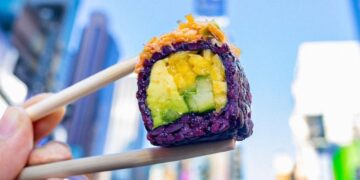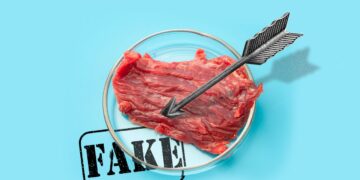[ad_1]
Fats. Simply that seemingly easy, three-letter phrase can conjure up ache for many people: childhood reminiscences of being made enjoyable of on the playground. A “earlier than image” taken at that weight-loss program we tried. A second stuffed with disgrace within the becoming room.
Flip the TV to any channel, flip by way of any style journal, scroll by way of any social media feed, and you’ll be thrust right into a world the place skinny individuals are celebrated and fats individuals are nowhere to be discovered. And but, fats individuals—a time period more and more and deliberately used to destigmatize and finally embolden—make up the overwhelming majority of Individuals.
In a world the place discrimination can vary from hurtful (fats individuals are routinely the butt of jokes in every thing from informal dialog to big-screen Hollywood motion pictures) to outright harmful (medical doctors repeatedly advise weight reduction, with out additional evaluation, to fats sufferers whereas recommending blood work, CAT scans, or bodily remedy for sufferers of smaller dimension experiencing the identical signs), fats individuals are repeatedly given the message that they’re unworthy. And the vegan neighborhood isn’t proof against this dangerous rhetoric both.
Veganism and food plan tradition have been confused for years, and because the motion grows stronger, the prevalence of health-focused messaging mixed with rampant physique policing is barely doing hurt. How can we pry aside plant-based advocacy from society’s too-prevalent anti-fat bias and work towards a size-inclusive motion? First, we’ve got to unpack the way in which we deal with fats individuals. And it’s an enormous downside.
All hail Lizzo
On the subject of shifting the dialog about fats our bodies and flipping the dangerous fatphobic gaze of society on its head, there may be maybe no extra seen agent of change than Lizzo. The 33-year-old pop star is as well-known for her advocacy for radical self-love as she is for her chart-topping hits, regularly celebrating her sensuality and proudly flaunting her physique throughout Instagram—in and of itself a radical act in a world the place fats our bodies are anticipated to cower and conceal in disgrace. Then there are the commenters. The louder her critics change into about her near-nude social media posts and brazen captions (“the subsequent time you wish to choose somebody for ingesting kale smoothies or consuming McDonald’s, or understanding or not understanding, thoughts your personal enterprise”), the bolder she turns into.
However as with every problem to the established order, Lizzo’s take-no-prisoners method is deeply uncomfortable to some—particularly those that have constructed their careers on making skinny our bodies. When The Greatest Loser star Jillian Michaels appeared on BuzzFeed’s digital morning present with a gripe about Lizzo’s public shows of self-adoration, the fallout was vital. “Why are we celebrating [Lizzo’s] physique?” questioned the health movie star. “‘Cuz it isn’t going to be superior if she will get diabetes. […] Like, I really like her music. […] However there’s by no means a second the place I’m like, ‘And I’m so glad she’s chubby!’”
Within the days following Michaels’ jab, the general public discourse round physique positivity was profound, with celebrities and pundits weighing in on what Lizzo—who went vegan in 2020 and repeatedly posts plant-based recipes to greater than 14 million TikTok followers—ought to do along with her physique. Although such Web page Six-worthy discussions are fewer and farther between in relation to different mega-famous singers whose our bodies conform to a social norm, one thing about Lizzo exhibiting off her curves unapologetically whereas twerking in a bikini was simply the kind of envelope-pushing that wakened a society-at-large that, in relation to confronting their complacent function in fat-shaming, had been largely asleep.
A not so (physique) constructive motion
The excitement that Lizzo’s body-love platform has created is a mirrored image of a motion that has gained reputation in recent times, because of the hashtag-happy tradition that helped to popularize it. However earlier than #fatacceptance was trending, there was physique positivity.
Based as a nonprofit in 1996 by writer Connie Sobczak and social employee Elizabeth Scott—two girls who will not be fats—The Physique Constructive group prides itself on instructing individuals find out how to reconnect with their innate physique knowledge as a way to have “extra balanced self-care.” The texture-good pillars that information the mission embody “declaring your genuine magnificence” and “cultivating self-love.” Although hailed as a corrective to the hatred that so many ladies have had towards their our bodies, the motion—which has spun out far past simply the preliminary group and change into a standalone social media development (with practically 16 million posts hashtagging #bodypositive)—has additionally undergone criticism.
In her 2020 ebook, What We Don’t Speak About When We Speak About Fats, writer Aubrey Gordon factors out what she sees as a obvious omission in physique positivity areas. “[W]hile physique positivity could also be growing particular person shallowness, it doesn’t appear to have made a dent within the prevalence of anti-fat attitudes and habits,” Gordon writes. Additional exemplifying this level is a 2019 Harvard study that discovered that of six implicit biases examined over a nine-year interval, anti-fat bias is the one one to have worsened over time.
De-centering essentially the most marginalized our bodies from social justice points which have gone mainstream sufficient to be considerably watered down—equivalent to with the case of physique positivity being so centered on “self-love” that it will probably really feel like an erasure of fats our bodies, that are amongst these most victimized in a thin-centric world—is nothing new. Because the Black Lives Matter motion grew in reputation and have become a mechanism for company “woke-washing,” the group that suffers essentially the most is Black trans individuals (accounting for the excessive prevalence of homicide and suicide amongst this demographic). Simply as caring about racial justice—in addition to fancying your self a feminist—arguably means the primary focus needs to be on liberating the Black trans neighborhood, to be “physique constructive” means the main target needs to be on attaining radical fats acceptance.
But for individuals who proceed to endure by the hands of the establishments and social queues that proceed to standardize anti-fat oppression, that ethical crucial is lacking from the narrative.
One-size-fits-all healthcare
If fats individuals had a nickel for each time a pal was performatively well-meaning in expressing concern for his or her “well being,” they’d be rich sufficient to run the world. And with the wage hole that discriminates in opposition to bigger our bodies (heavy girls earn $9,000 lower than their smaller counterparts whereas very heavy girls earned $19,000 much less), the additional cash can be welcomed.
So are you able to be fats and wholesome? In line with Dr. Yami Cazorla-Lancaster, the reply is a convincing “sure.” The pediatrician and way of life drugs doctor sees “healthism”—when an individual’s value is judged by their well being standing—as a means our society paints the so-called image of well being, and it runs deep. “Analysis exhibits that stigmatizing weight really results in worse outcomes for psychological and bodily well being,” says Cazorla-Lancaster, whose ebook, A Father or mother’s Information to Intuitive Consuming, covers matters from physique acceptance to way of life habits. “Maybe an individual’s well being needs to be simply between themselves and their healthcare supplier.”
And even when the disgrace and bullying concerned with healthism are sufficient to push fats individuals into the physician’s workplace, they’re nonetheless not protected from weight discrimination. Dr. Reshma Shah, writer and teacher at Stanford College College of Medication, suggests {that a} complete transforming of the doctor-patient relationship could also be so as. “Many individuals have reported receiving recommendation to ‘merely drop extra pounds’ because the therapy plan with out receiving a correct historical past,” Shah says, which can lead to probably life-threatening delayed or missed diagnoses.
In an effort to discover a safer house wherein to obtain medical therapy, some fats activists have embraced the Well being at Each Measurement (HAES) motion—which affords a set of ideas that removes the emphasis on weight reduction and redirects it to the pursuit of wellbeing. Past HAES’ deal with physique inclusivity, for Cazorla-Lancaster, it’s the social justice facet that’s particularly motivating. “[HAES] prompts us to think about the influences that atmosphere and privilege have on our physique dimension and well being,” she says.
For Chelsea Lincoln, a 25-year vegan who runs the body diversity-focused platform Fat Vegan Voice, imagining a world with out anti-fat bias is difficult—however the imaginative and prescient of what our tradition might change into if we embraced radical compassion for all beings retains her preventing. “With out fats bias, individuals can be more healthy, mentally and bodily,” she says, including that it “appears ironic since there may be the stereotype that being fats means unhealthy” when “with out weight stigma, individuals would naturally have intuitive consuming, be extra snug getting medical care, and medical doctors would really deal with the sufferers appropriately. Fats bias actually kills individuals.”
“Simply because it’s vegan doesn’t imply it’s wholesome”
One factor that separates Cazorla-Lancaster and Shah from different practitioners—together with some who rally behind HAES—is that these two medical doctors are vegan, which might be at odds with each ends of the spectrum. On one hand, mainstream drugs has traditionally not embraced plant-based consuming, whereas on the opposite, even the very progressive HAES shouldn’t be inherently vegan—presumably as a result of veganism might be offered as restrictive and subsequently convoluted with poisonous food plan tradition.
Satirically, the HAES motion’s dismissal of veganism ties into an even bigger concern plaguing many fats activists who’re additionally plant-based—and it hearkens again to that very concept that veganism is a weight-loss food plan, versus an ethics-driven selection. That is no shock, given the relentless conflating of plant-based dwelling with weight reduction by each the mainstream media and influencer tradition.
And due to the anti-fat society we stay in—and the dominant narratives about vegans, and what they eat and seem like—the very thought of vegan meals that’s not healthful and wholesome might be triggering for some. Comply with any fashionable vegan meals account on Instagram and also you’ll spot the remark, “Simply because it’s vegan doesn’t imply it’s wholesome” in much less time than it takes to faucet the “like” button beside that snap of wealthy, layered chocolate cake.
For Jessica Cruz, founding father of Vegan Road Honest Los Angeles and Vegan Trade—an annual and weekly occasion, respectively, that includes every thing from burgers and milkshakes to baklava and mushroom bao—the melding of veganism with well being is exasperating. Her social posts that includes indulgent avenue truthful meals are supposed to showcase how assorted fashionable vegan delicacies is, and the way a food plan with out animals doesn’t should imply deprivation. However invariably, commenters flock to the feed to supply reminders that vegan French fry-stuffed burritos aren’t a well being meals, which in fact, isn’t the purpose. “My responses to those misinformed feedback goal to teach people on how the moral a part of this motion doesn’t dictate how an individual ought to look or eat as a way to liberate animals, simply that they do every thing they will to liberate animals.”
The place veganism will get it proper
Anti-fat bias is a obvious downside in lots of vegan circles and the ripples of discrimination are felt far and large amongst those that determine as each fats and plant-based. “Imagine it or not, regardless of the immense strain for fats people to really feel depressing and ashamed of our our bodies, a few of us are proud of them, or have at the least internalized that our self-worth shouldn’t be dependent upon the our bodies we inhabit,” says Andy Tabar, proprietor of vegan message-wear model Compassion Co. and co-host of The Bearded Vegans podcast. “We’ve stepped off the yo-yo food plan infinity loop and are merely making an attempt to follow our ethics as finest we are able to, and meaning dwelling a vegan life—whereas fats.”
Previous to beginning his clothes enterprise (which affords sizes as much as 4X—he’s presently searching for bigger sizes that adhere to his moral requirements of manufacturing), Tabar spent years advocating at large-scale occasions. “I’ve talked to fats individuals who care about animals however by no means thought they may go vegan, or they thought that veganism was one thing they couldn’t discover as a result of they didn’t have any want to suit into that picture,” he says, mentioning that pro-vegan literature solely options slim and athletic-looking individuals.
Past the dearth of illustration and consideration in brochures, social media, occasions, and clothes manufacturers (most corporations solely carry sizes as much as XXL), fats vegans additionally face discrimination of their advocacy. “An elephant coach as soon as instructed me after noticing my sweatshirt that stated ‘Make Peace, Not Pork,’ that my dad and mom ought to have considered that earlier than they made me,” recollects Lincoln.
When fats vegans and their allies discuss fats liberation, too typically they’re met with pushback and non-sequiturs about how fats vegans “solely exist due to Oreos or different meals stereotyped to be [what] fats individuals eat solely,” Lincoln explains. “Physique sizes are numerous, and you can not inform what somebody eats or how lively they’re based mostly on their dimension. And regardless, everyone seems to be worthy of respect.”
Do one thing about food plan tradition
Honoring bodily integrity, practising empathy, and boycotting techniques that oppress marginalized communities are core ethics for a lot of vegans, and but, fats our bodies are sometimes pushed apart in favor of thinner ones that match the arbitrary, archaic, Americanized requirements of magnificence—that’s, able-bodied, white, and skinny. This colossal disconnect begs the query: on what planet is anti-fat bias part of animal liberation?
To achieve a very size-inclusive motion that embraces everybody, poisonous food plan tradition and veganism must be completely pried aside. However confronting a deeply entrenched, oppressive system from which many people have benefitted—whether or not or not it’s a tradition of white supremacy or anti-fat bias—requires the tough however needed means of deep self-examination.
“It begins with schooling. So fill your feed with fats activists (vegan and non-vegan), learn to determine anti-fat bias, and name it out,” suggests Tabar, who says we are able to additionally ask animal rights teams, magazines, and different advocacy platforms to incorporate fats our bodies of their literature, feeds, and outreach supplies. “But additionally, problem beauty range,” he continues. “If vegan organizations pay lip service to fats vegans in a social media publish […] however nonetheless discuss veganism as a weight-loss plan, deal with that.”
As many vegans know, systemic change begins with a private act. And in relation to confronting our anti-fat bias, meaning we have to confront self-directed fat-phobia, do the work wanted to show off our inside scripts that inform us we’re less-than as a result of we’re larger-than, and by no means joke about or disparage our our bodies. Others are watching, listening, and ingesting the negativity—even once we assume it’s solely about us.
How veganism can get it proper
For fats vegans, attaining that size-inclusive liberation motion the place everybody certainly feels they belong stays an uphill climb. Other than Lizzo, there are only a few reflections of bigger our bodies within the cultural zeitgeist, the institutional animal safety motion, and the digital universe of vegan influencers.
To be able to finish anti-fat bias and lengthen a justice-based worldview to incorporate all people, the illustration of fats (and different marginalized) our bodies must change into commonplace. Vegan messaging must be faraway from damaging weight-loss rhetoric altogether. Nosy associates should cease suggesting that their fats buddies ought to drop extra pounds and as an alternative work aggressively on their very own damaging perceptions and behaviors.
To actually get there, the liberation of all oppressed our bodies must be a core worth and follow amongst those that abstain from consuming animals. Medical professionals must deal with the affected person, not their dimension. For Tabar, these adjustments can’t occur quickly sufficient. “Perceive that this can be a social justice situation, not only a matter of physique positivity,” he says. “There’s systemic anti-fat bias that we can’t self-love our means out of.”
Jasmin Singer (jasminsinger.com) is the writer of The VegNews Information to Being a Fabulous Vegan, the editor of the forthcoming anthology Antiracism in Animal Advocacy: Igniting Cultural Transformation, and the co-host of the Our Hen Home podcast.
Love the plant-based way of life as a lot as we do? Get the BEST vegan recipes, journey, movie star interviews, product picks, and a lot extra inside each situation of VegNews Journal. Discover out why VegNews is the world’s #1 plant-based journal by subscribing as we speak!
[ad_2]
Source link







